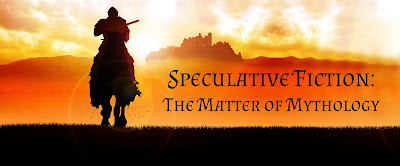Confession: I have never been a big fan of mythology. I've just always thought it was kind of dumb. People really believed in those stories? How is that possible?
But I still read Greek myths, and I never batted an eye at the mythological creatures that inhabit Narnia. Furthermore, I very much enjoyed the Percy Jackson series, and was super excited when the official greenlight on the Disney+ adaptation was announced.
I do see why someone would be concerned about the inclusion of elements of mythology: mythology is inherently anti-biblical, presenting
a view of the world that is based upon false gods and imaginary spirituality. Some
have asserted that such use of mythology—particularly in Christian stories such
as The Chronicles of Narnia—distorts the truth and causes readers to
become dangerously comfortable with alternate worldviews and religions, that
even Christ-figures such as Aslan are problematic and draw readers away from
the truth (Kjos).
Certainly stories that assert as their premise that mythology
and false gods are real—the Percy Jackson series by Rick Riordan, for
example—could be challenging for young readers and readers with little discernment,
though I would suggest that mature, discerning readers can enjoy these tales
simply as entertaining fiction. Yet it is possible to include mythological
creatures and even gods in a way that is not inconsistent with Christianity.
In
Narnia, for instance, fauns, centaurs, dryads, and even Bacchus and Silenus are
created beings subject to Aslan just as much as the Talking Beasts are—simply a
part of the worldbuilding. Indeed, leading children astray by familiarizing
them with myths and setting up false pictures of Christ was not Lewis’s
intention, nor is it the intention of any writers of Christian fantasy I have
encountered. Rather, Lewis’s intention was to enhance rather than destroy
children’s faith as is evident from the letter he wrote to the mother of
Lawrence Krieg.
Lawrence was concerned that he was “loving Aslan more than
Jesus” but Lewis asserted that “the things he loves Aslan for doing and saying
are simply the things Jesus really did and said. So that when Lawrence thinks
he is loving Aslan, he is really loving Jesus: and perhaps loving Him more than
he ever did before” and then suggested a prayer for Lawrence to pray that further
exemplifies this intention (C. S. Lewis Letters to Children, 52-53). Like
magic, mythology and symbolism must be used wisely and with caveats, not
elevating these mythological figures to a status that replaces God, but within
a proper framework, it too can be a powerful storytelling and worldbuilding
tool even in Christian speculative fiction.
Besides, even though mythology was created as an alternative explanation for the universe, the stories and creatures are often highly creative and perfectly useful to fantasy writers. Certainly, deep worldbuilders may look down on you for not inventing something entirely new, but there is nothing new under the sun and I see no less reason to incorporate fauns and centaurs into your worldbuilding than elves. Though one must naturally take care to put one's own twist on things. While straight-up copying out of copyright things may not technically be illegal, it's still lazy. And there's so much that can be done with mythological creatures and tales.
Speculative Fiction: Real or Not Real?
References
Kjos, Berit. “Narnia Part 1: Blending Truth and
Myth.” Crossroad, Kjos Ministries, Dec. 2005, http://www.crossroad.to/articles2/05/narnia.htm.
Accessed 1 Oct. 2021.
Kjos, Berit. “Narnia Part 2: A Four-legged Creator
of Many Worlds.” Crossroad, Kjos Ministries, Dec. 2005, http://www.crossroad.to/articles2/05/narnia-2.htm.
Accessed 1 Oct. 2021.
Kjos, Berit. “Narnia Part 3: Christian allegory +
Mythical gods = Deception.” Crossroad, Kjos Ministries, Dec. 2005, http://www.crossroad.to/articles2/05/narnia-3.htm.
Accessed 1 Oct. 2021.
Kjos, Berit. “Narnia Part 4: Awakening Narnia with
Bacchanalian Feasts.” Crossroad, Kjos Ministries, Dec. 2005, http://www.crossroad.to/articles2/08/caspian-4.htm.
Accessed 1 Oct. 2021.
Lewis, C. S. C.S. Lewis Letters to Children. Edited
by Lyle W. Dorsett and Marjorie Lamp Mead, Macmillan, 1985.


No comments:
Post a Comment
Share your thoughts! I love getting comments. Please keep them clean and relevant to the post. Thank you!